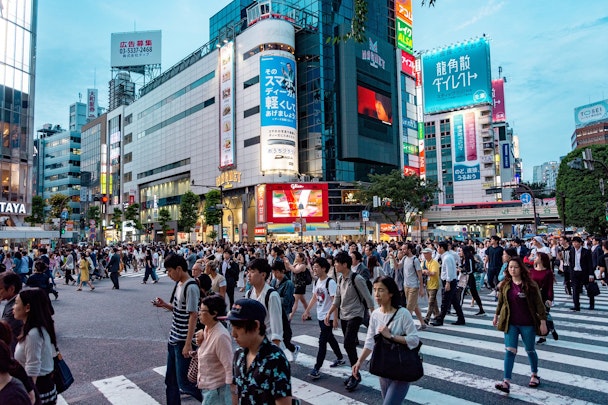Women occupy less than 15% of senior management roles in Japan, we explore why
Just 14.7% of senior and management positions in Japan were occupied by women in 2021. A mixture of strong traditional gender norms, which reinforce unconscious biases combined with lower wages for women and a lack of structural support is holding women back in business – and the ad industry is no exception.

japan
The Drum spoke to Kyoko Matsushita, CEO of WPP, Japan and Kyoko Yonezawa, head of innovation, TBWA\Hakuhodo about the role the industry can play in improving representation and inclusion for Japanese women.
In the World Economic Forum's Global Gender Gap Index, Japan ranks 116 out of 146 countries globally.
The benchmark, which ranks the countries based on the current state and evolution of gender parity across four areas, such as economic participation and opportunity, educational attainment, health and survival, and political empowerment, is a revealing insight into the global status of a populous nation that is steeped in tradition and the gender norms and bias that comes with that.
With just 14.7% of senior and management positions in Japan occupied by women in 2021, The Drum asked two advertising leaders for their perspectives on what is holding the nation back from achieving gender equality.
In Japan, two key factors play a role in preventing women from rising through the ranks in corporations, according to Kyoko Matsushita, the chief executive office of WPP Japan.
Firstly, there are large systemic issues at play," she says. "Japan is still ill-equipped to support women being both mothers and successful in their careers. Those who decide to have children face numerous obstacles, working essentially a triple shift of running the household, caring for their children and working a job. Coupled with significantly lower wages than their male counterparts, it is far from accommodating for working mums (and even more so single mothers), resulting in a system that keeps mothers away from the workplace for years at a time, with each passing year making it harder and harder to return.
Advertisement
"Secondly, severe unconscious bias exists in Japan. The National Women's Education Center tracked young male and female employees from 2015-19 and found a startling result: while 96.9% of men and 60.0% of women had managerial aspirations in their first year of employment, this gap widens further to 87.9% for men and 37.6% for women five years after joining the company. What this equates to is female employees losing hope for their aspirations throughout their careers. Today, 54.5% of women feel that being a woman is a disadvantage in the workplace, with 31.8% believing they need to change jobs because of the gender pay gap – 2.5x higher than men," says Matsushita.
It's easy to see how these elements can lead to a generation of disenfranchised women. However, Kyoko Yonezawa, head of innovation at TBWA\Hakuhodo says the problem is perpetuated by the entire nation's widespread discomfort and uneasiness about discussing and examining the topic of gender equality.
"In Japan especially, when the issue of gender equality is raised, the conversation quickly becomes more general and vague, even when the focus is on the phenomenon where women (pop approx. 64 .5 million) are the majority (male pop approx. 61 million) are treated as a minority. Why? Maybe because they don't want to accept the hard reality. I can only guess."
Yonezawa believes things in Japan will not change however, until the country as a collective address the inequality and take action.
"The first step to making any change is to face the inequalities and unconscious bias that exist in laws and social systems, in corporate rules and culture, in the way people work, and in the family. Then we can start trying to remove bias to the extent that all stakeholders (which is everybody) can. Without this, progress will be made very, very slowly," Yonezawa says.
Advertisement
Gender parity in advertising
Unfortunately, Japan's advertising industry does not boast greater gender representation than other industries in the country. There remain significant challenges in overcoming unconscious bias - both in terms of gender norms around women working and then the hiring of women for senior roles.
More than 76% of Japanese people surveyed by the Cabinet Office confirm these gender biases - 50.3% of men and 47.1% of women believe it is the male’s job to support the family financially.
The bias goes some way to explaining why there are so few women in leadership roles in advertising. Which then creates a self-perpetuating cycle, according to Yonezawa.
"There is a lack of role models and the general work culture to achieve work-life balance is almost impossible," she says.
"To the question, "Why are there so few women?”, the constant response is along the lines of: "We interviewed great candidates, but there were no women, unintentionally". This idea of the "good/capable candidate" is a complicated concept. I think usually it refers to someone who creates "good work" - but the creative industry is where the criteria for "good work" cannot be simply quantified or verbalized.
"So, for many years, we have taken the method of judging the "good work of today" by referring to the "good work of the past". And here lies the problem because the "good work of the past" has been created mainly by men before women became actively involved in the industry. This powers the spiral where men are given the opportunity to be in a position to create great work.
"The standards which have become ingrained over the years are distorted. I think we can say everyone in the industry, including myself, is affected by unconscious bias, says Yonezawa.
Suggested newsletters for you
Can advertising change Japan's gender issue?
Matsushita believes the industry has a unique opportunity, and a responsibility, to advocate for women in the work it creates.
"When it comes to creating brand communications, at WPP, we believe we have a responsibility to use our platform and the power of creativity for good; we are committed to ensuring our work advocates for women throughout Japan and will actively turn down any work that frustrates the cause of females in the workplace."
She points to a campaign for P&G’s haircare brand Pantene which highlighted the archaic hair-style regulations that are imposed on candidates attending job interviews in Japan. The 'Hair We Go' campaign, created by Grey, has received support from corporations across Japan who have committed to loosening interview guidelines to enable applicants to express individuality and diversity.
Matsushita is also using her position at the helm of WPP Japan to address gender imbalance through hiring and staff retention initiatives.
"In Japan, there continues to be little movement to address gender imbalance, with the industry preferring to focus on improving working hours. While we support this renewed focus on work-life harmony, we at WPP believe that females and mothers in the workplace deserve extra attention; it is still a long way from where we want it to be in Japan," she says.
Matsushita says currently 41.6% of WPP's agency leadership are women, "while we are proud to have already made great strides with our agency leadership, we know that there is still a lot of work to be done in ensuring equal representation across all levels."
With WPP Japan planning to expand its operations threefold over the next five years, the holding company is perfectly placed to address gender imbalances through hiring initiatives.
"As part of our ambitious growth targets, we are committed to nurturing Japan’s top talent and providing them not only a place to grow but also a place to return to keep growing should they wish to have children.
"Women make up half of Japan, and it is only right that they make up half of WPP. Women should no longer face an either-or decision when it comes to having a career and a family," says Matsushita.

